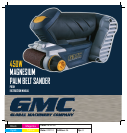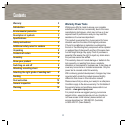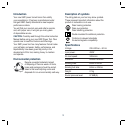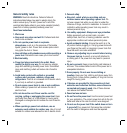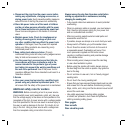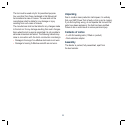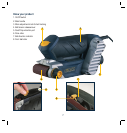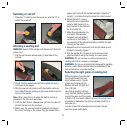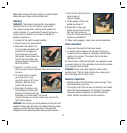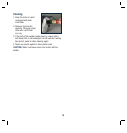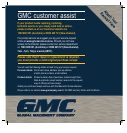
5
c. Disconnect the plug from the power source before
making any adjustments, changing accessories, or
storing power tools. Such preventive safety measures
reduce the risk of starting the power tool accidentally.
d. Store idle power tools out of the reach of children
and do not allow persons unfamiliar with the power
tool or these instructions to operate the power tool.
Power tools are dangerous in the hands of untrained
users.
e. Maintain power tools. Check for misalignment or
binding of moving parts, breakage of parts and
any other condition that may affect the power tools
operation. If damaged, have the power tool repaired
before use. Many accidents are caused by poorly
maintained power tools.
f. Keep cutting tools sharp and clean. Properly
maintained cutting tools with sharp cutting edges are less
likely to bind and are easier to control.
g. Use the power tool, accessories and tool bits etc.,
in accordance with these instructions and in the
manner intended for the particular type of power
tool, taking into account the working conditions and
the work to be performed. Use of the power tool for
operations different from those intended could result in a
hazardous situation.
5. Service
a. Have your power tool serviced by a qualified repair
person using only identical replacement parts. This
will ensure that the safety of the power tool is maintained.
Additional safety rules for sanders
WARNINGS. Before connecting a tool to a power source
(mains switch power point receptacle, outlet, etc.) be sure
that the voltage supply is the same as that specified on the
nameplate of the tool. A power source with a voltage greater
than that specified for the tool can result in serious injury to
the user, as well as damage to the tool. If in doubt, do not
plug in the tool. Using a power source with a voltage less
than the nameplate rating is harmful to the motor.
Always remove the plug from the mains socket before
making any adjustments or maintenance, including
changing the sanding belt.
• Fully unwind cable drum extensions to avoid potential
overheating.
• When an extension cable is required, you must ensure
that it has the right ampere rating for your power tool
and is in safe electrical condition.
• After long working periods external metal parts and
accessories could be hot.
• If possible, always use clamps or a vice to hold your work.
• Always switch off before you put the sander down.
• Do not force the sander; let the tool do the work at
a reasonable speed. Overloading will occur if too
much pressure is applied and the motor slows
resulting in inefficient sanding and possible damage
to the sander motor.
• When sanding wood, always connect the dust bag
or use a dust extraction system.
• Before using the sander with metal, always remove
the dust bag from the outlet as sparks may ignite the
dust or the bag.
• Do not continue to use worn, torn or heavily clogged
sanding belts.
• Do not touch the moving sanding belt.
• Ensure that you have removed foreign objects such as nails
and screws from the work before commencing sanding.
• Rags, cloths, cord, string and the like should never be left
around the work area.
• Use safety equipment including safety goggles
or shield, ear protection, dust mask and protective
clothing including safety gloves.
Wear goggles
Wear earmuffs
Wear a breathing mask



